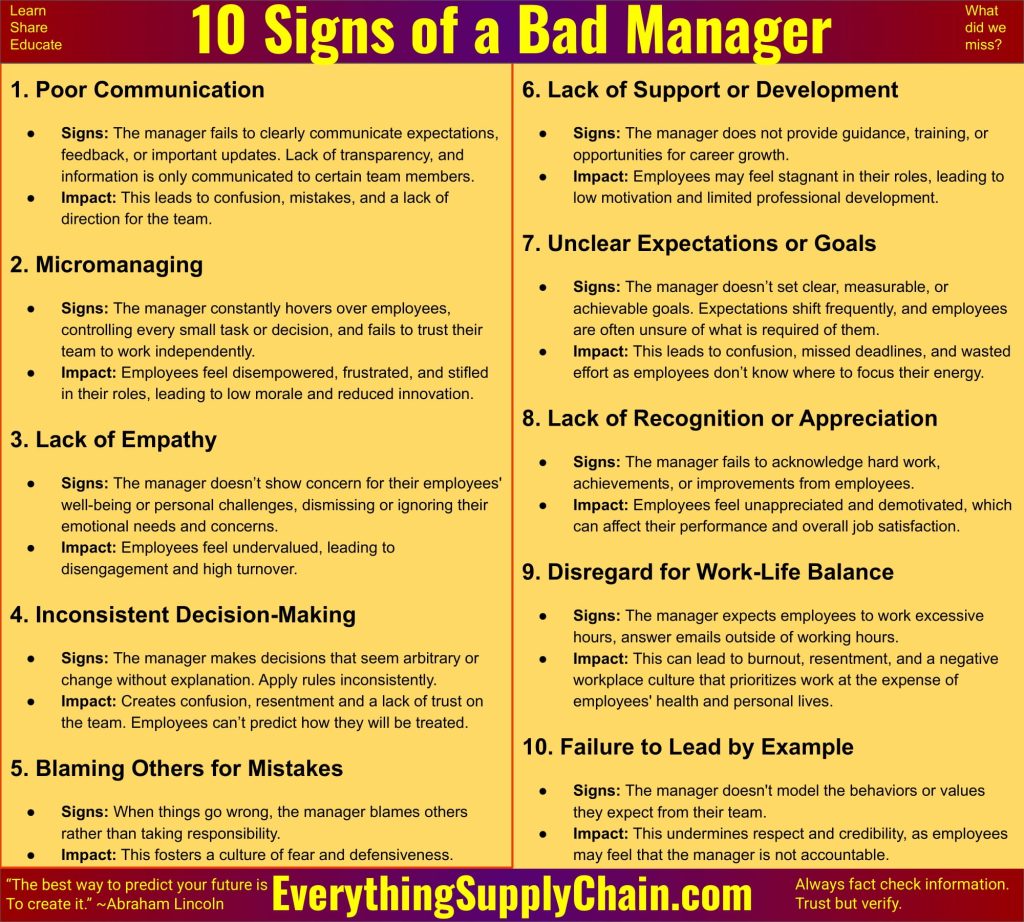10 Signs of a Bad Manager.
Recognizing signs of a bad manager early can help address issues before they lead to long-term dissatisfaction, low productivity, and high turnover. A bad manager can significantly impact both the well-being of their team members and the overall success of the company. In contrast, a good manager fosters clear communication, empathy, and support, ultimately leading to a more engaged, motivated, and productive team. Here are 10 signs to help recognize a bad manager. Much more information is below.

Further Details on Signs of a Bad Manager:
1. Poor Communication
- Signs:
- The manager fails to regularly share key information or updates with the team.
- Instructions are vague or contradictory, leaving employees unsure of what is expected of them.
- Feedback is not provided consistently or is only given during performance reviews, leaving employees uncertain about their strengths and areas for improvement.
- They don’t encourage open dialogue or questions from the team, creating a one-way communication flow.
- Impact:
- Employees often feel left out of the loop, leading to confusion and mistakes. This lack of clarity can result in frustration and low morale because employees are unsure if they are meeting expectations.
- Team cohesion suffers when communication is not transparent or frequent, which can harm collaboration and trust within the team.
2. Micromanaging
- Signs:
- The manager gets involved in every little task and insists on approving every decision, even those that are minor or could be easily handled by employees.
- They constantly check on progress, provide excessive direction, and don’t allow team members to take ownership of their work.
- There’s little to no delegation of responsibilities, and employees feel like they have no autonomy to make decisions.
- Impact:
- This behavior leads to employee frustration and disengagement, as team members feel they are not trusted to do their jobs. Over time, it can erode confidence and initiative.
- The manager ends up overburdened by tasks that could be delegated, which leads to burnout and stress, while the team’s growth and morale are stunted.
3. Lack of Empathy
- Signs:
- The manager is indifferent to employees’ personal struggles or concerns, often dismissing or downplaying them.
- They don’t check in with employees to see how they are doing emotionally or professionally, nor do they offer support during difficult times.
- Employees feel that their well-being is not a priority, and the manager’s decisions don’t take into account the human side of their team.
- Impact:
- Employees may feel disconnected from their manager and undervalued. This lack of empathy can lead to disengagement, poor morale, and even mental health issues like burnout or stress.
- When employees feel like their needs aren’t being considered, it becomes harder for them to fully invest in their work, leading to lower productivity and job dissatisfaction.
4. Inconsistent Decision-Making
- Signs:
- The manager’s decisions often seem to lack logic or fairness, and the reasons behind them are unclear or rarely explained.
- Rules and guidelines change frequently, leaving employees confused about what’s expected of them or what will happen next.
- The manager may favor certain employees or departments without clear justification, creating perceptions of bias.
- Impact:
- Inconsistency in decision-making can create an atmosphere of uncertainty and distrust. Employees may feel that they are being treated unfairly or that their contributions are not being recognized equally.
- This inconsistency leads to frustration, as employees cannot predict how their manager will respond to various situations, making them feel unsupported and demotivated.
5. Blaming Others for Mistakes
- Signs:
- When things go wrong, the manager is quick to point fingers at others rather than taking responsibility for their own role in the situation.
- The manager may publicly shame or criticize employees for mistakes, making them feel blamed for problems beyond their control.
- There is little effort to analyze what went wrong and how to learn from the mistake, focusing only on assigning blame.
- Impact:
- This behavior creates a toxic culture of fear where employees are reluctant to admit mistakes or offer new ideas. A blame-oriented approach undermines trust and open communication.
- Employees who are frequently blamed may begin to feel demoralized, leading to disengagement and decreased productivity. It also prevents growth and problem-solving because mistakes aren’t seen as learning opportunities.
6. Lack of Support or Development
- Signs:
- The manager does not provide feedback, guidance, or mentorship to help employees improve their skills.
- There are no clear opportunities for professional growth or advancement, and employees feel stuck in their roles.
- The manager may fail to recognize and nurture the strengths of individual team members or neglect to provide resources for career development.
- Impact:
- Without opportunities for development, employees are likely to feel stagnant and unchallenged in their roles. Over time, this can lead to dissatisfaction and, ultimately, high turnover rates as employees seek growth elsewhere.
- When employees are not supported in their development, it impacts both individual and team performance. Teams may also lose out on innovation and creativity because they aren’t encouraged to improve.
7. Unclear Expectations or Goals
- Signs:
- Employees are unclear on what success looks like or what their individual and team goals are.
- The manager fails to establish specific, measurable objectives, or changes them frequently without providing sufficient explanation.
- Tasks and deadlines are often vague, and there is no regular feedback on whether goals are being met.
- Impact:
- Employees can feel lost or frustrated without a clear understanding of what’s expected of them. When goals are not well-defined, it becomes difficult to prioritize tasks, leading to inefficiency and missed deadlines.
- The lack of clarity can result in misalignment within the team, causing conflicts and ultimately reducing overall productivity.
8. Lack of Recognition or Appreciation
- Signs:
- The manager rarely acknowledges or praises employees for their hard work, achievements, or contributions.
- Employees’ successes are often overlooked, and even when they are recognized, it may feel insincere or minimal.
- The manager may show favoritism by only acknowledging certain individuals or teams while ignoring the efforts of others.
- Impact:
- Lack of recognition can make employees feel undervalued and demotivated. Over time, this leads to a decrease in morale and productivity.
- Employees who are not recognized for their hard work may lose interest in going the extra mile, as they don’t feel their contributions are appreciated.
9. Disregard for Work-Life Balance
- Signs:
- The manager expects employees to work long hours, regularly respond to emails or messages after work hours, or skip personal time for work obligations.
- There is little to no consideration of employees’ personal lives or family obligations, and there may be a “always on” mentality in the team.
- The manager does not lead by example, frequently overworking or failing to take breaks, creating an unhealthy culture.
- Impact:
- This disregard for work-life balance can lead to burnout, increased stress, and a lack of job satisfaction. Over time, employees may feel resentful or disconnected from the organization.
- When employees don’t feel they can take time for themselves, it negatively impacts their mental and physical well-being, resulting in reduced productivity and higher turnover.
10. Failure to Lead by Example
- Signs:
- The manager sets poor examples by being consistently late, avoiding difficult tasks, or not meeting their own deadlines.
- They may demonstrate behaviors they expect employees to avoid (e.g., dishonesty, lack of accountability, or unethical conduct).
- The manager doesn’t follow the company’s values or policies, creating a disconnect between their actions and the company’s culture.
- Impact:
- Employees will lose respect for a manager who doesn’t model the behaviors and work ethic they expect from the team. It undermines trust and can set a poor example for others to follow.
- When a manager fails to lead by example, it creates a disconnect in the team, causing employees to question the company’s values and practices. Employees may feel demotivated or disengaged.
Good and Bad Manager Quotes
- “Nothing will kill a great employee faster than watching you tolerate a bad one.” ~Perry Belcher
- |Bad managers don’t listen to their employees because it makes them feel insecure when they find that employees are smarter than themselves.” ~Anonymous
- “If your actions inspire others to dream more, learn more, do more and become more, you are a leader.” ~John Quincy Adams
- “When leaders read quotes about bad leadership the first thing they do is see who needs to change. Instead leaders should first look at themselves to see what they need to change.” ~Dave Waters
- “The single biggest way to impact an organization is to focus on leadership development. There is almost no limit to the potential of an organization that recruits good people, raises them up as leaders and continually develops them.” ~John Maxwell
- “You have brains in your head. You have feet in your shoes. You can steer yourself, any direction you choose.” ~Dr. Suess
- “Leaders with toxic behaviors thrive on controlling people instead of inspiring them.” ~Simon Sinek
- “Peace is not absence of conflict, it is the ability to handle conflict by peaceful means.” ~Ronald Reagan
Don’t Be a Bad Leader Resources
- Apple Steve Jobs The Crazy Ones – THINK DIFFERENT.
- Dan Pink: The puzzle of motivation
- Famous People Who Failed at Their First Attempt – Motivational video
- Warren Buffett: Amazon’s Jeff Bezos Changed The World In A Big Way
- What Not to Say in an Interview, and What to Say.
- 10 Reasons Good Employees Quit and How to Fix.










